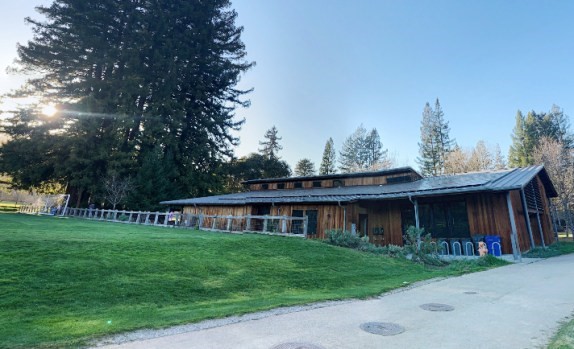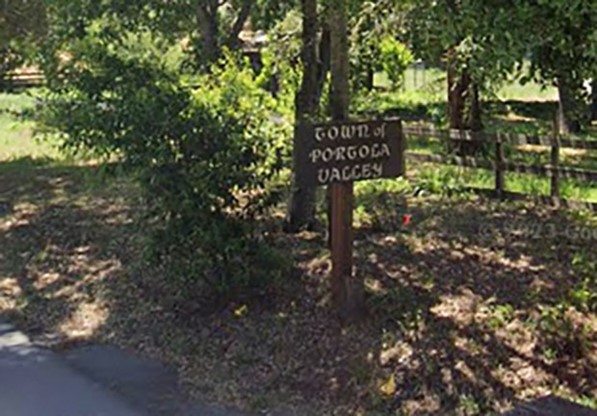The town is the first to have its housing element decertified by the state, which means it loses out on key state infrastructure funds
https://www.mercurynews.com/2024/04/02/portola-valley-housing-element-decertified-california

The Portola Valley Town Center that includes playing fields, a County library, a Community Hall, a Town Hall and a Maintenance Building. (Google Maps)
By KATE TALERICO | ktalerico@bayareanewsgroup.com | Bay Area News Group
PUBLISHED: April 2, 2024 at 4:38 p.m. | UPDATED: April 3, 2024 at 3:21 p.m.
Wealthy Portola Valley earlier this year became one of the first towns in San Mateo County to receive state approval for its plan to build more housing.
Known officially as a housing element, the state requires cities to draft and get approval for plans outlining how much and which types of housing they will build in the coming eight years.
But regulators at California’s Housing and Community Development Department says that plan isn’t worth anything if the city isn’t following through on it — and, as it turns out, Portola Valley isn’t.
So state regulators last week decertified Portola Valley’s housing element, opening it up to consequences like the builder’s remedy, which allows developers to ignore a city’s local zoning rules and get housing of any scale approved, so long as 20% of the units are affordable. Non-compliant jurisdictions also aren’t eligible for certain state and federal grants.
And while even housing advocates admit that solving California’s housing crisis probably isn’t going to hinge upon whether Portola Valley builds the 253 homes the state says it is on the hook for, regulators’ crackdown on the wealthy enclave west of Palo Alto could signal to cities that getting a housing element approved doesn’t mean the work is done — rather, it’s just beginning.
A Welcome to Portola Valley sign off Alpine Road in Portola Valley, Calif. (Google Maps)
“It’s unfortunate that the residents of Portola Valley may have worse roads and fire evacuation routes because the community and some of their elected leaders won’t prioritize housing,” said Jeremy Levine, policy manager for the Housing Leadership Council of San Mateo County, a pro-housing advocacy group.
“Portola Valley made a contract with the state they have to follow through on,” Levine added. “That’s what cities should keep in mind — if you make a promise, you have to keep it.”
The state is increasing the pressure on localities — even a town of about 4,400 like Portola Valley — in an effort to get each city to do its part in building 441,000 homes before 2031 to meet the Bay Area’s housing needs.
Portola Valley’s Town Council approved the draft housing element on a 3-2 vote in late January. The state signed off on it a few days later.
But to keep the plans from merely gathering dust, the state also requires cities to turn key components of the plan into law, including by re-drawing their zoning map, which dictates the density of different neighborhoods.
Historically, Portola Valley hasn’t allowed multifamily housing complexes to be built in town. As a result, the community is a homogenous enclave: 75% white (compared to 35% in San Mateo county overall), with a median household income of $250,000 and an average home value of $3.8 million. As of 2020, 81% of the town’s housing stock was made up of single-family homes, many on lots of an acre or larger.
The town’s latest housing element intends to change that by creating two new zoning districts that would allow for multifamily housing between four and 20 units per acre — think townhouses or low-rise, mixed-use apartments.
State law required the town to follow through on those re-zonings by Jan. 31 of this year — about two months ago. Yet, the Town Council still hasn’t approved the rezoning.
That’s perhaps unsurprising, given the town leadership’s frustration around the housing element process in the first place.
“The process with HCD has been expensive and time-consuming and has cost us disproportionately, given our town’s small size, staff and budget,” Mayor Sarah Wernikoff told The Almanac in January. Vice Mayor Judith Hasko ended up voting against the housing plan, saying that it “significantly erodes our Portola Valley historical zoning and land use methods.”
Portola Valley officials have said that they want to get further community input, including feedback from the city’s architectural design committee, before they move forward with a rezone. The city’s planning commission is set to review that committee’s feedback at their meeting Wednesday, and could send the rezoning plan to the Town Council by mid-April.
To housing advocates like Levine, there’s already been enough community meetings about the housing element — 148 hours and 47 meetings, The Alamanac reported.
“Portola Valley has held dozens of meetings to make this decision.” Levine said. “The transparency being called for now is a stall-and-delay tactic.”




Bullying and mandates are demeaning and rarely accomplish good.
Bay Area communities are unique, organically grown and represent long-term components of residents’ life planning and portfolio.
If Portola Valley is 75% white then it also welcomed 25% non whites which all happened without mandates.
The tone of this article suggests that hostile government threats of a “builders remedy” seem be more related to ill-conceived ideas about race than housing.